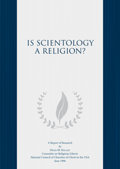The above observations may be viewed against various definitions of “religion.” Three will be used here. The first is the definition outlined by the California court in Fellowship of Humanity. The court wrote:
Religion simply includes:
(1) a belief, not necessarily referring to supernatural powers; (2) a cult, involving a gregarious association openly expressing the belief; (3) a system of moral practice directly resulting from adherence to the belief; and (4) an organization within the cult designed to observe the tenets of the belief.
153 Cal.App.2d at 693 (1957) indentation supplied
A. “A belief, not necessarily referring to supernatural powers.” The court does not indicate what kind of level of belief is referred to, but religion has traditionally dealt with “ultimate” questions, such as the meaning and purpose of life, the nature and destiny of the universe, whether life continues after death, etc. Scientology provides an elaborate conceptual framework within which some of these kinds of questions seem to be answered. Though not all are explicitly addressed, the anxieties of adherents about them seem to be allayed. Scientology deals very explicitly, however, with the question of death, and in somewhat the same way as Neoplatonism and Christian Science (by denying the reality or importance of the body) and some Eastern traditions (reincarnation in successive bodies). Like some other religions (Buddhism, Confucianism, Taoism), it does not contemplate two orders or levels of existence, natural and supernatural, but only one. It does not provide detailed conceptual content for the “Eighth Dynamic” or the “Supreme Being,” but does leave a place for it, unlike some bodies characterized by courts as religions (Fellowship of Humanity, Washington Ethical Society (249 F.2d 127), Ethical Culture and Secular Humanism (Torcaso v. Watkins, footnote, 367 US. 488)).
B. “A cult, involving a gregarious association openly expressing the belief.” What is meant here by a “cult”? The Oxford English Dictionary defines “cult” as:
1. worship—1683.
2. a particular form of religious worship; esp. in reference to its external rites and ceremonies—1679.
There is no pretense of worship, in the Judeo-Christian sense, being carried out in the Church of Scientology. There is a chapel in each of the Scientology facilities where a few Scientologists gather on Sunday for a lecture or to listen to tapes on a particular subject. Respondents did not seem to think that this practice was of great importance in the Scientology scheme of things or that conventional worship occurred there.
The whole of Scientology, however, is a “gregarious association expressing the belief, ” and several social gatherings (including the chapel services) are “gregarious” (as opposed to individual or one-on-one) activities. These are explicitly characterized as “Third Dynamic” (group life) events.
C. “A system of moral practice directly resulting from an adherence to the belief. ” Scientology has an extensive body of literature on “ethics”—which seems to be what the court is referring to by moral “practice.” It even has “ethics officers” to counsel with adherents who may have deviated from the ethical standards promulgated by the group. (Contrary to the court’s contention, there are generally-recognized religions—animism, some forms of Hinduism, etc.—that do not have an ethical dimension, though they usually do project a (non-ethical) system of conduct or action for believers of a ritual or propitiatory nature.)
D. “An organization within the cult designed to observe the tenets of belief.” Scientology is nothing if not a vast and elaborate “organization…designed to observe the tenets of belief.” (If “cult” means “worship,” it is hard to see what “within the cult” can mean.) Every Scientology installation has a large wall-chart listing column after column of offices or functions, with both a day and night staff in some cases. (Not all positions may be filled at a given time, but most of them seem to be most of the time.) That huge and serried organization exists to carry on the work of Scientology, which is essentially to recruit and train adherents in the practice of Scientology. Whether that practice is “religion” or not, however, is not determined by whether it has an organization to carry it out but by what the practice itself is, and by what kind of beliefs it observes or promulgates, which is dealt with in Point A above.
The definition of “religion” used so “simply” by the court in Fellowship of Humanity is not altogether conclusive for our purposes, since it includes some elements (worship, ethics) not universally found among acknowledged religions, and it is not entirely clear or internally consistent in its use of terms: Is “cult” in (2) the same as “cult” in (4)? How is a “gregarious association” (2) different from “an organization within the cult” (4)? The definition does not specify what type of “belief” is religious, as distinguished from philosophical, ethical, psychological, political or technological, so a further clarification seems necessary.





























